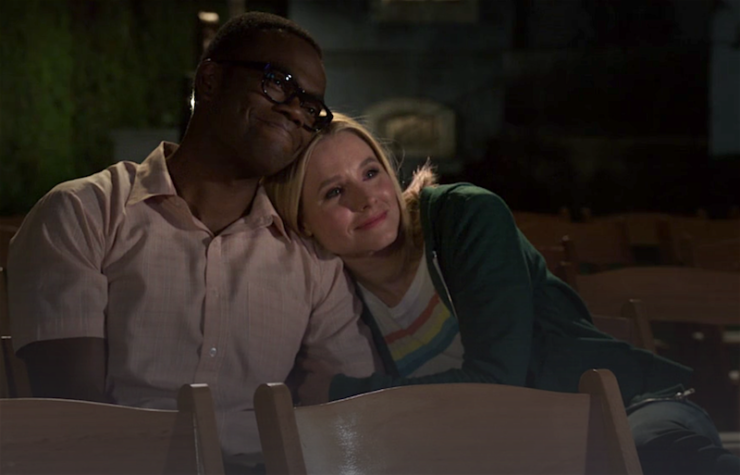I admit this to you, dear readers, on the privacy of the internet: I am that person who did not want Scully and Mulder to get together. (Although, for what it’s worth, I am also that person who did want Will and Hannibal to get together.) When I was very smol, and watched Cheers, I loved Will They/Won’t They. But pretty much every subsequent iteration has left me cold. Things I hate: when a sitcom becomes about the tension between two people, because I don’t think that’s enough of an engine for an ensemble show; that until very recently the trope has been relentlessly heteronormative; the way Will They/Won’t They makes romantic love the prime motivator and ultimate focus of life; that it sexualizes everything in an already extremely sexed-up television world. But most of all, I hate the way this tension has ruined a lot of great TV friendships and professional partnerships.
Having said all of that, I want to take a moment and a few thousand words to celebrate one particular, potentially mythic Will They/Won’t They: Eleanor and Chidi on The Good Place.
Warning: Here be spoilers for The Good Place, Community, Parks and Recreation, and, possibly, the ultimate fate of the universe.
Cheers set the standard for the trope back in 1982, with the tension between Sam and Diane driving the first couple of seasons.
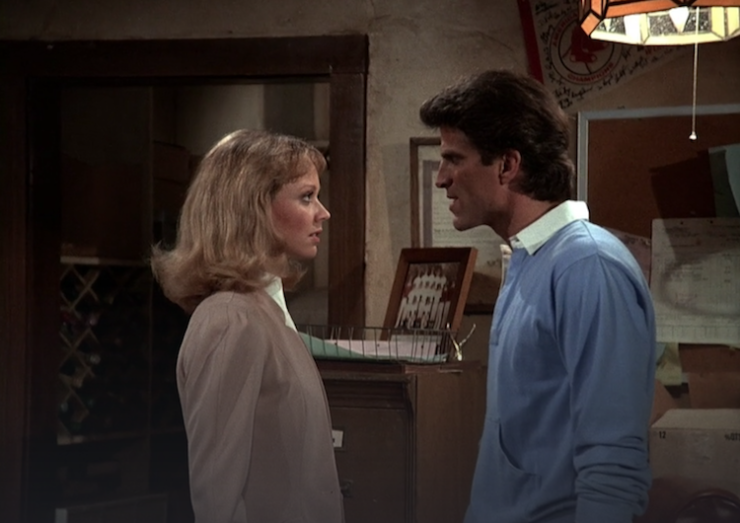
But the reason Cheers is remembered as one of the greatest sitcoms of all time is that the writers figured out not only how to keep the relationship interesting, but also how to create a new focus and build the ensemble even after Shelley Long left the show, by creating a very different kind of tension between Sam and newcomer Rebecca Howe, and by emphasizing the idea that the Cheers gang was a found family.
But after this benchmark, most of the other shows that relied on WT/WT floundered: There was The Post-Consummation Collapse (Moonlighting and Northern Exposure); The Frustrated Audience (The X-Files); The Is This Love Or Just Fucking Creepy? (Ross and Rachel, Daphne and Niles); The Traumatic Morning After (Buffy and Angel, first on Buffy and then later on Angel); and the Very Special Near-Rape Episode (Buffy again, but with Spike this time).
Only a handful of shows have done truly interesting things with WT/WT since the late ’90s. Newsradio (my personal pick for All Time Greatest Office Comedy) and Parks and Recreation (my personal pick for All Time Greatest Office Comedy, Runner Up) serve as interesting mirrors. They looked upon the glory of Cheers, knew they could never match its brilliance, and subverted it by just having the characters become a couple quickly, and then working around it. In Newsradio’s case, Dave Nelson and Lisa Miller had an on-again-off-again hook-up that started in the second episode and turned into a real relationship for a few seasons. The characters made a big fuss of keeping it secret, only to find out that their coworkers already knew, and didn’t really care. Since the audience knew the coworkers already knew (and didn’t care), the WT/WT tension was redirected into watching Dave and Lisa twist themselves into unnecessary knots.
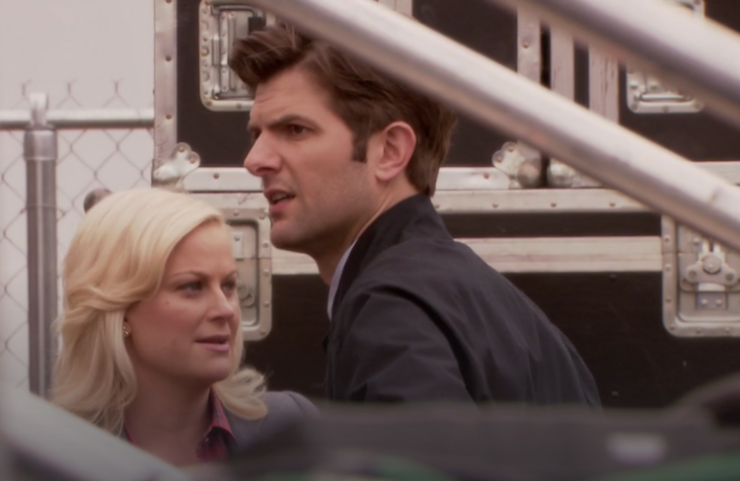
Twenty years later, Parks and Rec did a similar dance with Leslie Knope and Ben Wyatt, but it was short-lived because they were too darn charming. The two of them are so #relationshipgoals that their love ends up becoming the show’s axis mundi, and all the rest of the silliness revolves around it, usually thrown into relief by their solidity.
Wait, Leah, you said you hated WT/WT? You sound pretty positive right now. Well, yes, ’cause I haven’t talked about Community yet.
Now. I love Community…but. I have a lot of emotions about Community. At the opening they promised a standard sitcom format: venal lawyer becomes a better person to impress a hot, morally superior woman. Over the course of the first season the morally superior woman was shown to be a three-dimensional person with some severe anxiety issues, and the venal lawyer was shown to kind of enjoy his, um, venal-ness. So far, so good. But when the WT/WT tension was resolved by the two of them hooking up, the show began a trend that only got more annoying: Britta becomes emotionally attached to Jeff, and forces a competition with his other potential love interest, Statistic Professor Michelle Slater. She confronts them publicly, humiliating Jeff. He responds by rejecting both of them publicly, humiliating them in return, and then runs straight into the arms of their (much) younger mutual friend, Annie.
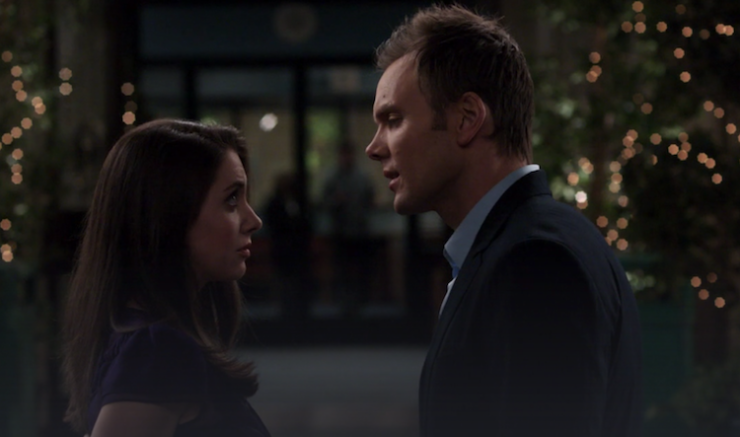
Over the course of the rest of the show, Jeff and Britta are fuck-buddies, a relationship not often seen in primetime TV, but, the show also put Britta and Annie in direct competition for other men in addition to Jeff (despite about a decade’s age-difference). While Annie and Jeff both end the show well on the way to careers, and with a hint that they might get serious about each other in the future, Britta wades through two seasons of sexual tension with Troy that is then handwaved away, and ends her arc many, many credits short of her degree and owing thousands of dollars in back rent to Annie and still working bad shifts at an empty dive bar. The show’s foundational WT/WT ends up reinforcing a weirdly Puritanical sexual ethic, where the caddish man and the lovestruck virgin are both rewarded with upbeat endings, while the older nontraditional woman is punished with debt and a series of shitty jobs.
Armed with this extensive emotional baggage around fictional characters’ emotional baggage, I happily flung myself at The Good Place, expecting a high concept fish-out-of-water comedy about a self-described “Arizona trashbag” trying to lie her way into Heaven. I love Michael Schur with all my heart and all my mind, and I trust him to write a good show.
I thought I would be safe from WT/WT.
BUT NO.
Almost immediately, Eleanor and the audience are introduced to the idea that everyone in the Good Place is assigned a soulmate.
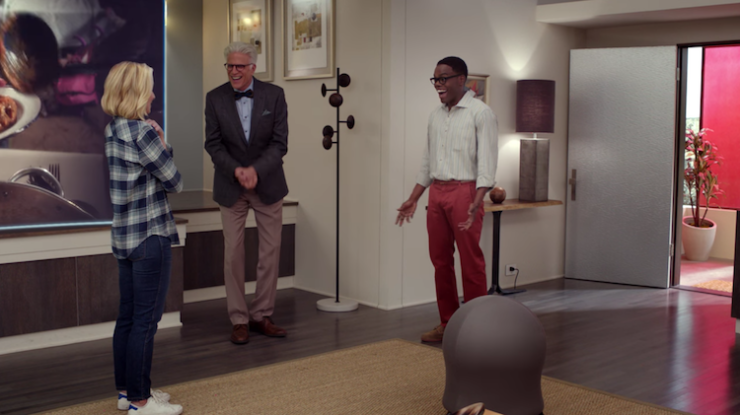
DAMMIT. I grumbled to myself. Now she’s going to have to try to get this uptight Chidi character to fall in love with her despite the fact that they’re terrible for each other, and that’s going to become the center of the show, and I’m going to hate it. But I resolved to stick it out for the sake of Ted Danson.
But then…it didn’t become that at all. Yes there was a little bit of WT/WT between them, but mostly it was Will She/Won’t She Become a Decent Person. Eleanor didn’t even realize she was falling for Chidi until the tenth episode of a thirteen-episode season, and she seemed to be fighting it as much as I was:
There are way more things I hate about Chidi than like about him. His stupid Clark Kent glasses, his extensive turtleneck collection, oh, and he loves ethics so much. He once talked about John Rawls for two hours… I timed it. And he only stopped because he saw me timing him. Granted, he laughed, and kind of made fun of himself, it was a nice moment, but still. He always twitches his eyebrows when he says “absolutism,” and he tilts his head whenever I say anything ignorant, but he never makes fun of me, which is nice. He’s also incredibly patient, and kind, and surprisingly jacked, and, oh, fork, I’m in love with Chidi!
But since a couple of episodes later Michael revealed that they were in the Bad Place all along and activated the first of many reboots, Cheleanor didn’t have time to gum up the show’s clockwork.
Season 2 became an extraordinary high-wire act, as the writers took the core foursome through not one but 802 reboots, with Eleanor and her friends eventually figuring out the truth about the Bad Place every time. And buried within Episode 3, “Dance Dance Resolution”—mostly a Jason episode about his 60-person dance troupe—we learn that in some of those permutations Eleanor and Chidi run away to the Medium Place as a couple. Not only do the two of them sleep together, but more importantly, Eleanor tells Chidi she loves him and means it (something she never did in life) and Chidi immediately says he loves her too (thus making a choice without his usual stomach-churning indecision). We don’t see this happen directly—we see it because Mindy St. Clair shows (highly invasive) video footage to Eleanor, who has no memory of it.
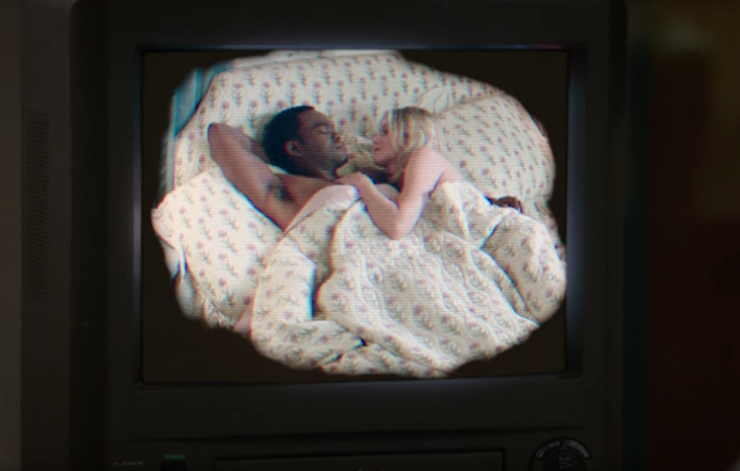
But once again, the WT/WT doesn’t get to torpedo the show. Instead, the rest of the season becomes about Michael trying to become good, the group’s attempt to appeal their cases to the Judge in the hope of earning a spot in the Good Place after all. This 803rd (I think?) reboot group is sent back to Earth to start over, with Michael saving their lives and monitoring their moral progress. This is where the WT/WT becomes an unexpected fulcrum for the show. In the season 2 finale, “Somewhere Else,” the now-living Eleanor is given a pep talk and a couple of free margaritas by a bartender who turns around to reveal himself as Michael with a towel draped over his shirt—Cheers’ Sam Malone all grown up, dispensing hard-earned wisdom.
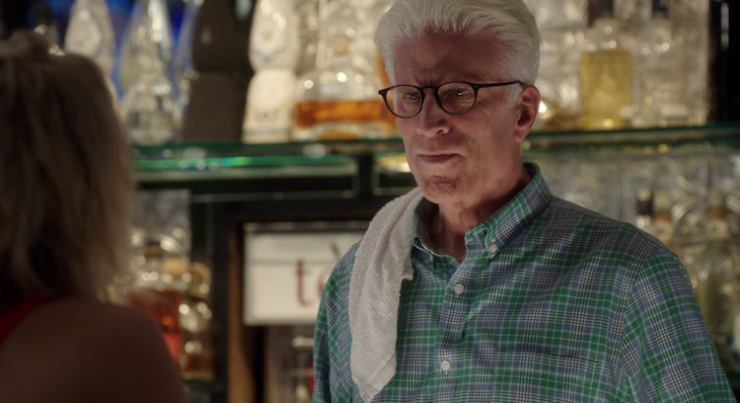
Reader, I screamed at the TV.
Michael drops a hint to send Eleanor off to find Chidi, but once again the show steps away from the potential of WT/WT by creating a beautiful dynamic between Eleanor, Chidi, and Chidi’s academic partner/girlfriend Simone. The new situation allows Chidi and Eleanor to be much more equal, since Chidi isn’t as much her mentor this time around, and Eleanor and Simone form a tight friendship of their own. Plus it’s fantastic to see Chidi, somewhat more confident in his own right, maintaining a happy relationship with a fellow academic. The only real tension between the three of them is based in Chidi’s worry that he needs to stay professional with his research subjects, but that’s a doomed enterprise when you have Jason around, anyway.
But of course, Michael Schur can’t allow the show to roll along to smoothly, so Michael accidentally tells them about the afterlife, meaning they can’t get into the Good Place no matter what they do, and once he and Janet explain the True Nature of the Universe in “Jeremy Bearimy,” Chidi has a total mental breakdown.
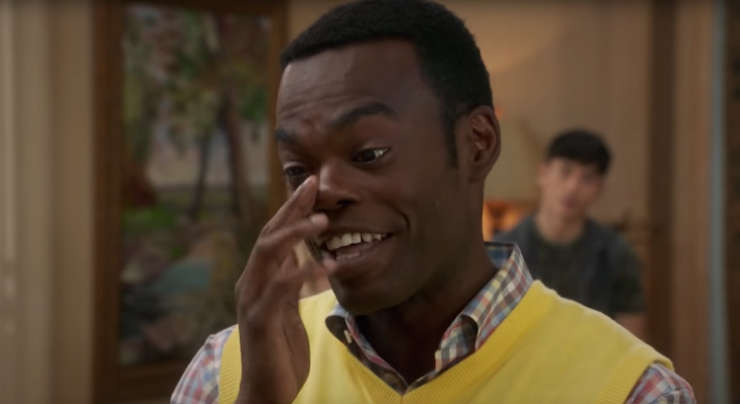
But it’s Eleanor who comes and rescues him. She’s the one who pulls him back from his Nietzschean brink, and gives him a reason to keep going. Obviously for plot reasons she can do this because she’s part of the 803rd (maybe???) reboot, but thematically she can do this because her love for Chidi is not based on the rollercoaster of WT/WT. And he’s able to listen to her because he loves her, too…but then he’s able to sacrifice the relationship with Simone out of a different intensity of love and concern for her, and Eleanor is able to help because she loves her friends, not because she has any designs on Chidi.
Three episodes later, when Michael reluctantly shows Eleanor some of her afterlives and she sees that she and Chidi were occasionally a thing, she chooses to pursue him. This is fascinating—this current iteration of Eleanor has never been dead, has never been really in love with anyone, preferring hook-ups and self-interest. She’s rebuilt her life since the Shopping Cart Incident, yes, but she’s been just a friend to both Chidi and Simone, and seems as interested in the idea of herself in love as interested in Chidi. At least at first. By the time Eleanor is having an emotional breakdown in Janet’s void, it’s based purely on the fact that for the first time in her memory she’s making herself vulnerable to another person, and that person seems to be rejecting her. This is fascinating to me because for the first time in the show’s run we get the idea that Eleanor’s own self-perception is tangled in her feeling for Chidi. She literally loses sight of who she is until he kisses her.
This is important. Just as she was the one who snapped Chidi out of his existential freefall in “Jeremy Bearimy,” so he rescues her from hers.
And since Chidi is, um, rather buttoned down, it takes him an entire episode to start expressing how he feels for her.
So just as they start to get comfortable with each other, running the newest reboot of the Good Place with Eleanor kind of being Cruise Director and Chidi gearing up to be her right-hand man, Ethics Guy, the Bad Place finds a way to throw a wrench at them: A newly-deceased Simone shows up in the waiting room. Chidi knows he won’t be able to perform his role if he has to see her every day, which will doom not just Simone, but all of humanity to the Bad Place, forever and ever, amen. Just as he sacrificed his own happiness for the sake of Simone’s soul in life, now he must do it, for literally everyone, in the afterlife.
Of course this time the sacrifice isn’t only his, hell, it isn’t even mostly his—Eleanor is the one who will have to go through every eternal day watching the only person she’s ever truly loved offer her pleasant smiles with no idea of their history. And at this point season 4 is a total roulette wheel: maybe Cheleanor will rise again? Maybe Chimone will fall for each other as they did in life? Maybe there won’t be any romance at all? It won’t matter—Eleanor and Chidi’s time in paradise is over, never to be regained, unless there’s some reboot in the future where they all remember everything.
Or, well, I’ll let them say it:
Chidi: I am not even scared to get rebooted cause I know you’ll be there, taking care of me. Time means nothin’. Jeremy Bearimy, baby. We’ll get through this, and then you and I can chill out in the dot of the “i” forever.
Eleanor: Right. We’ll be OK. We’ve found each other before, hundreds of times. We can do it again.
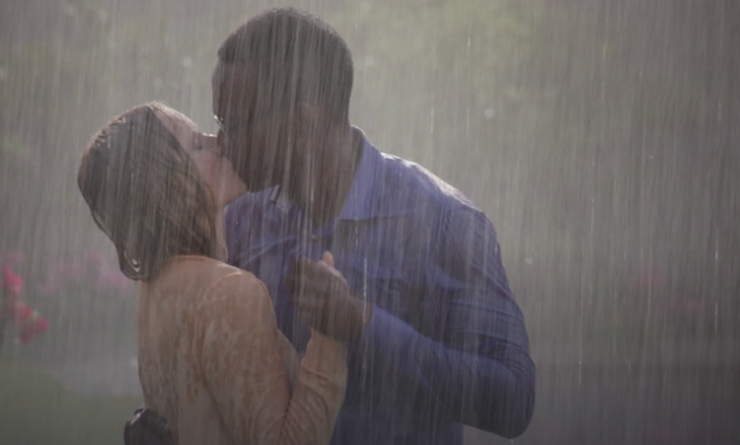
Schur has taken a WT/WT and exploded it, subverted it, made it irrelevant, all in the name of showing different kinds of love: friendship that stays friendship, friendship that becomes romantic love, love that puts the good of the other person before one’s own self-interest, love that becomes sacrifice.
Except…wait a minute. What if that isn’t what’s going on at all? Or, it is what’s going on, but what’s going on is even more significant that your usual plot about star cross’t love? Because look at the conversation Eleanor has with Janet (all-knowing, all-seeing not-robot Janet) right after Chidi’s been rebooted:
Janet: In all this chaos, in this Pandemonium, you and Chidi found each other and you had a life together! Isn’t that remarkable?
Eleanor: Pandemonium is from Paradise Lost. Milton called the center of Hell Pandemonium, meaning place of all demons. Chidi tricked me into reading Paradise Lost by telling me that Satan was, and I quote, “my type”…big mean bald guy with a goatee, I mean, he wasn’t wrong.
Janet: No, that’s very on-brand for you.
Eleanor: I guess all I can do is embrace the pandemonium.
Janet has a very particular expression when she uses the word Pandemonium. She’s clearly carefully considering which word to use. And Eleanor’s face quirks in recognition when she hears it, and sure, she might be thinking of her crush on Stone Cold Steve Austin—but no. When you look at the show’s cosmology, a very different, potentially revolutionary Will They/Won’t They comes into focus.
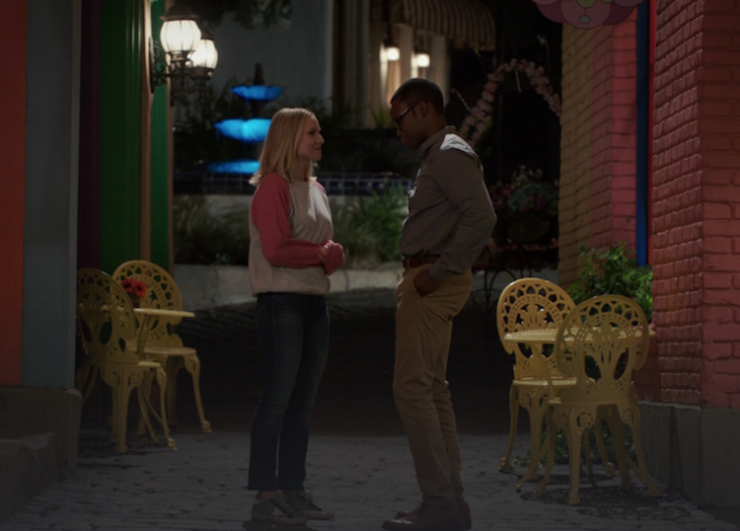
The name “Eleanor” is Greek for “bright, shining one” and the name “Chidi” means “God exists” in Igbo.
You see where I’m going with this, right?
Eleanor is the Devil, Lucifer, Morningstar, Bringer of Light, the most beautiful angel of all, and certainly a legit snack? Chidi is in fact God, so desperate always to do the morally correct thing because of the unimaginable weight of being the one who got us all into this mess called life?
So is it possible that The Good Place has taken a page from countless avatars, messiahs, fantasy novels, William Blake’s poetry, Kevin Smith’s Dogma, and even Neil Gaiman’s version of Death? Have God and the Devil chosen to take mortal bodies, to live and die countless times, always, inexorably drawn back to one another, over and over again, to work out their shirt?
Michael Schur and the writers of The Good Place have given us the ultimate, Divine Will They/Won’t They.
Or at least the best one since Cheers.
Leah Schnelbach has never wanted a theory to be right so much in her life. Come join her in the torrid love affair that is Twitter!










